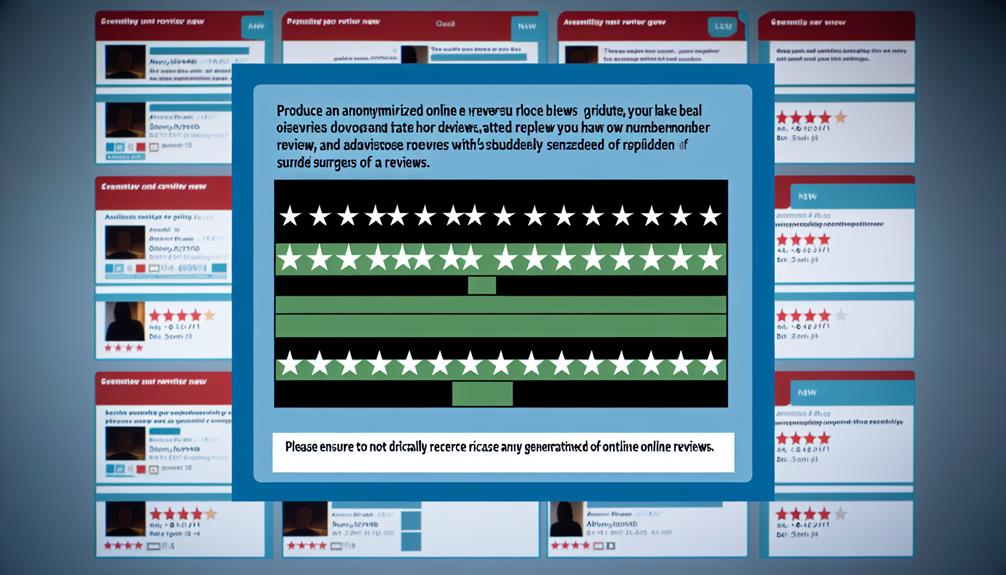With the rise of online reviews shaping consumer decisions, distinguishing genuine feedback from fake reviews has become crucial. The digital landscape is inundated with deceptive practices, making it challenging to discern the authenticity of testimonials.
From inconsistencies in review patterns to suspicious spikes in ratings, there are several red flags to watch out for. However, one must also consider the subtler cues, such as the lack of specific details or repetitive language, which may indicate a fabricated review.
Moreover, unverified reviewer identities add another layer of complexity to the task of deciphering the legitimacy of online feedback. These are just a few indicators that warrant a closer look into the realm of Google reviews.
Key Takeaways
- Irregular review timing and suspicious sources indicate potential fake reviews.
- Lack of specific details and vague descriptions raise credibility concerns.
- Overly positive or negative language and promotional tones suggest fake reviews.
- Unverified reviewer identities and lack of profile activity signal potential fake reviews.
Inconsistent Review Patterns

In analyzing the authenticity of Google reviews, one of the key indicators to look out for is the presence of inconsistent review patterns. This inconsistency can manifest in various ways, such as irregular review timing and questionable review sources. Review timing refers to the frequency at which reviews are posted. Inauthentic reviews may exhibit suspicious patterns, such as a sudden influx of positive reviews within a short period or a cluster of negative reviews targeting a specific timeframe. Genuine reviews are more likely to be spread out over time, reflecting the natural ebb and flow of customer experiences.
Moreover, scrutinizing the sources of reviews is crucial in detecting inconsistencies. Fake reviews often originate from suspicious accounts with limited activity, few reviews, or profiles that lack credibility. In contrast, authentic reviews typically come from active users with a history of leaving reviews across various businesses. Discrepancies in the sources of reviews, such as a surge in reviews from unfamiliar accounts or a sudden spike in reviews from profiles with minimal activity, raise red flags regarding the legitimacy of the feedback.
Lack of Specific Details
A critical aspect in evaluating the authenticity of Google reviews involves scrutinizing the level of specificity provided within the feedback. When reviews lack specific details and are filled with vague descriptions or ambiguous language, it raises concerns about their credibility. Genuine reviews typically contain specific information about the product, service, or experience being reviewed. Specific details help readers understand the reviewer's perspective and make an informed decision based on the feedback provided.
Reviews that are vague in nature, lacking specifics such as what exactly the reviewer liked or disliked, can be a red flag. For example, a review stating, 'It was terrible,' without any further explanation or examples, is not helpful to other consumers. On the other hand, a review that mentions specific aspects like 'The customer service was slow, and the food was cold,' provides valuable insights that readers can use to assess the business accurately.
Ambiguous language that does not clearly convey the reviewer's thoughts or experiences may indicate that the review is fake or misleading. Authentic reviews tend to be detailed, providing context to support the reviewer's opinions. Therefore, when assessing the legitimacy of Google reviews, pay close attention to the level of specificity and clarity in the feedback provided.
Sudden Spike in Reviews

An abrupt surge in the number of reviews posted within a short timeframe could raise suspicions regarding the authenticity of the feedback provided on Google. When examining reviews, it's essential to consider both the review timing and the review content.
Review Timing and Content Analysis
| Timing of Reviews | Content of Reviews |
|---|---|
| – Numerous reviews posted in a short period | – Similar wording in multiple reviews |
| – Reviews concentrated around a specific date | – Lack of specific details or examples in reviews |
| – Reviews posted outside typical business hours | – Excessive use of overly positive or negative language |
| – Reviews mainly posted on weekends or holidays | – Reviews mentioning unusual details not experienced by others |
When reviews flood in suddenly, especially if they are clustered around particular dates or times, it can indicate potential manipulation. Additionally, if these reviews contain repetitive language or lack specific details, this further raises red flags. Genuine reviews are more likely to be spread out over time, vary in content, and provide nuanced experiences. Therefore, a sudden spike in reviews should prompt a closer examination of their authenticity based on both timing and content.
Repetitive Language or Phrases
Repetitive language or phrases observed across multiple reviews can serve as a significant indicator of potential falsified feedback. When assessing the authenticity of Google reviews, paying attention to the review tone and frequency of specific phrases is crucial. Fake reviews often exhibit a consistent tone or use the same phrases repeatedly, which can be a red flag for manipulation.
In genuine reviews, you would expect to see a variety of language styles and unique perspectives reflecting the diverse experiences of different customers. However, fake reviews tend to lack this diversity and instead may sound overly positive, generic, or unnatural. For instance, if multiple reviews use identical wording to describe a product or service, it could indicate a coordinated effort to deceive potential customers.
Moreover, reviewing the frequency of specific phrases or keywords across multiple reviews can help uncover patterns that suggest inauthentic feedback. Genuine reviews typically contain a range of vocabulary and expressions based on individual encounters, whereas fake reviews might be strategically crafted to include certain keywords for search engine optimization purposes or to create a false sense of popularity.
Therefore, when analyzing Google reviews for legitimacy, be wary of reviews that exhibit repetitive language, overly positive tones, or an unusually high frequency of specific phrases, as these could be signs of fake feedback aimed at misleading consumers.
Unverified Reviewer Identities

When assessing the authenticity of Google reviews, the verification of reviewer identities plays a crucial role in determining the credibility of the feedback provided. Unverified reviewer identities can stem from unreliable sources, leading to potential bias in the reviews. This lack of verification raises concerns about the legitimacy of the feedback and the motivations behind it.
To highlight the impact of unverified reviewer identities, consider the following scenarios:
| Scenario | Description | Potential Consequences |
|---|---|---|
| Reviewer uses a pseudonym | The reviewer's identity is concealed behind a false name, making it challenging to authenticate their experience. | Readers may question the credibility of the review due to the lack of transparency. |
| Multiple reviews from the same unverified account | A single account posts numerous reviews without verifiable details, indicating a potential bias or agenda. | Businesses may receive skewed ratings, affecting their reputation based on potentially biased feedback. |
| Reviewer profile lacks personal information | The reviewer provides minimal personal details, making it hard to ascertain their authenticity. | Readers might question the genuineness of the review, impacting their trust in the feedback. |
Frequently Asked Questions
Can Fake Google Reviews Be Removed or Reported to Google for Investigation?
When addressing the removal of fake Google reviews or reporting them for investigation, individuals can engage in these processes. Google offers avenues for reporting fraudulent reviews, triggering an investigation into their authenticity.
If found to be fraudulent, consequences may include removal by Google. It is advisable to follow Google's guidelines and policies to ensure the credibility of reviews on the platform.
Taking prompt action can help maintain the integrity of online reviews.
Are There Any Legal Consequences for Businesses Caught Using Fake Reviews?
Businesses caught using fake reviews may face severe legal implications. False advertising, deceptive practices, and violating consumer protection laws are potential consequences. Legal actions can lead to fines, reputational damage, and even lawsuits.
It is crucial for businesses to maintain integrity and authenticity in their online presence to avoid legal troubles associated with fake reviews. Compliance with regulations and ethical standards is paramount for long-term success and customer trust.
How Do Fake Reviews Impact a Business's Reputation and Credibility?
Fake reviews can severely impact a business's reputation and credibility. These deceptive practices can mislead potential customers, damaging trust and leading to negative consequences such as loss of sales and brand loyalty.
Businesses risk tarnishing their hard-earned reputation by resorting to fake reviews, as once exposed, the repercussions can be significant and long-lasting. Upholding authenticity and transparency in online reviews is crucial for maintaining a positive image and fostering customer trust.
Can Competitors Leave Fake Reviews to Sabotage a Business's Online Reputation?
Competitors have been known to engage in unethical tactics such as leaving fake reviews to harm a business's reputation. This online sabotage can severely impact a company's credibility and trustworthiness among potential customers.
Effective reputation management strategies are essential to combat such malicious acts. Businesses must prioritize review authenticity and monitor their online presence diligently to identify and address any fake reviews promptly, safeguarding their reputation in the digital space.
Are There Any Tools or Services Available to Help Businesses Detect and Combat Fake Reviews on Google?
Review monitoring and reputation management are crucial for businesses. A recent study by BrightLocal found that 82% of consumers read online reviews for local businesses.
To combat fake reviews on Google, businesses can utilize tools like ReviewTrackers or Grade.us. These platforms offer monitoring services that analyze review patterns and help identify suspicious activities.
Conclusion
In conclusion, identifying fake Google reviews can be done by analyzing inconsistent review patterns, lack of specific details, sudden spikes in reviews, repetitive language or phrases, and unverified reviewer identities. By paying attention to these indicators, businesses can protect their online reputation and maintain trust with their customers.
It is essential to remain vigilant and proactive in detecting and addressing fake reviews to ensure the credibility and integrity of online feedback.

